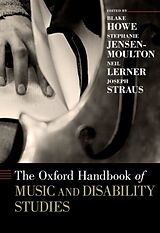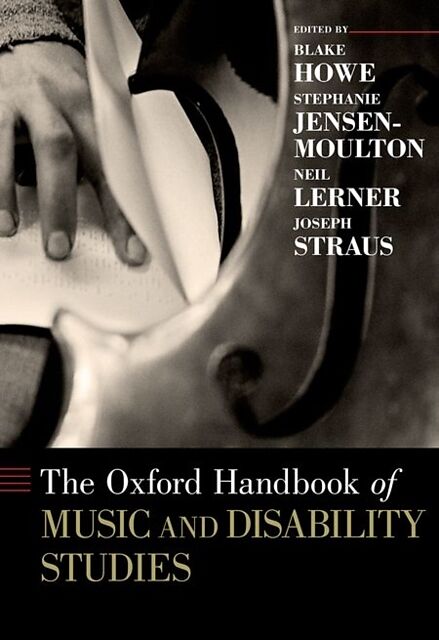The Oxford Handbook of Music and Disability Studies
Einband:
Fester Einband
EAN:
9780199331444
Genre:
Music
Autor:
Blake (Assistant Professor of Musicology, As Howe
Herausgeber:
OXFORD UNIV PR
Erscheinungsdatum:
10.12.2015
Like race, gender, and sexuality, disability is a social and cultural construction. Music, musicians, and music-making simultaneously embody and shape representations and narratives of disability. Disability - culturally stigmatized minds and bodies - is one of the things that music in all times and places can be said to be about.
The newly emerged interdisciplinary field of Disability Studies offers a sociopolitical analysis of disability, focusing on its social construction, and shifting attention from biology to culture. In the past fifteen years, disability-related scholarly work has been undertaken in a variety of disciplines, and disability now occupies a central place in cultural analysis, along with well-established categories like race/ethnicity, gender, sexuality, and class.
The Oxford Handbook of Disability Studies represents a comprehensive "state of current research" for the field of Disability Studies and Music. The forty-two chapters in the book span a wide chronological and geographical range, from the biblical, the medieval, and the Elizabethan, through the canonical classics of the eighteenth and nineteenth centuries, up to modernist styles and contemporary musical theater and popular genres, with stops along the way in post-Civil War America,
Ghana and the South Pacific, and many other interesting times and places. Disability is a broad, heterogeneous, and porous identity, and that diversity is reflected in the variety of bodily conditions under discussion here, including autism and intellectual disability, deafness, blindness, and mobility impairment
often coupled with bodily deformity. Cultural Disability Studies has, from its inception, been oriented toward physical and sensory disabilities, and has generally been less effective in dealing with cognitive and intellectual impairments and with the sorts of emotions and behaviors that in our era are often medicalized as "mental illness." In that context, it is notable that so many of these essays are centrally concerned with madness, that broad and ever-shifting cultural category. There is
also in impressive diversity of subject matter including YouTube videos, Ghanaian drumming, Cirque du Soleil, piano competitions, castrati, medieval smoking songs, and popular musicals.
Amid this diversity of time, place, style, medium, and topic, the chapters share two core commitments. First, they are united in their theoretical and methodological connection to Disability Studies, especially its central idea that disability is a social and cultural construction. Disability both shapes and is shaped by culture, including musical culture. Second, these essays individually and collectively make the case that disability is not something at the periphery of culture and music, but
something central to our art and to our humanity.
Autorentext
Blake Howe is Assistant Professor of Musicology at Louisiana State University. Stephanie Jensen-Moulton is Assistant Professor of Musicology at Brooklyn College, City University of New York. Neil Lerner is Professor of Music and Co-Coordinator of the Interdisciplinary Minor in Film & Media Studies at Davidson College. Joseph Straus is Distinguished Professor of Music at the Graduate Center of the City University of New York.
Klappentext
The Oxford Handbook of Disability Studies represents a comprehensive state of current research for the field of Disability Studies and Music. The forty-two chapters in the book span a wide chronological and geographical range, from the biblical, the medieval, and the Elizabethan, through the canonical classics of the eighteenth and nineteenth centuries, up to modernist styles and contemporary musical theater and popular genres, with stops along the way in post-Civil War America, Ghana and the South Pacific, and many other interesting times and places. Disability is a broad, heterogeneous, and porous identity, and that diversity is reflected in the variety of bodily conditions under discussion here, including autism and intellectual disability, deafness, blindness, mobility impairment often coupled with bodily difference, and cognitive and intellectual impairments. Amid this diversity of time, place, style, medium, and topic, the chapters share two core commitments. First, they are united in their theoretical and methodological connection to Disability Studies, especially its central idea that disability is a social and cultural construction. Disability both shapes and is shaped by culture, including musical culture. Second, these essays individually and collectively make the case that disability is not something at the periphery of culture and music, but something central to our art and to our humanity.
Inhalt
Introduction: Disability Studies in Music; Music in Disability Studies
Blake Howe, Stephanie Jensen-Moulton, Neil Lerner, Joseph Straus
Part 1. Disability Communities
1. Toward an Ethnographic Model of Disability in the Ethnomusicology of Autism
Michael B. Bakan
2. Music, Intellectual Disability, and Human Flourishing
Licia Carlson
3. Imagined Hearing: Music-Making in Deaf Culture
Jeannette DiBernardo Jones
4. Musical Expression among Deaf and Hearing Song Signers
Anabel Maler
5. The Politics of Sound: Music and Blindness in France, 1750-1830
Ingrid Sykes
6. "They Say We Exchanged Our Eyes for the Xylophone": Resisting Tropes of Disability as Spiritual Deviance in Birifor Music
Brian Hogan
7. Understanding is Seeing: Music Analysis and Blindness
Shersten Johnson
Part 2. Performing Disability
8. Mechanized Bodies: Technology and Supplements in Björk's Electronica
Jennifer Iverson
9. Subhuman or Superhuman? (Musical) Assistive Technology, Performance Enhancement, and the Aesthetic/Moral Debate
Laurie Stras
10. Disabling Music Performance
Blake Howe
11. Music and Bodily Difference in Cirque du Soleil
Stephanie Jensen-Moulton
12. Punk Rock and Disability: Cripping Subculture
George McKay
13. Moving Experiences: Blindness and the Performing Self in Imré Ungár's Chopin
Stefan Sunandan Honisch
14. Stevie Wonder's Tactile Keyboard Mediation, Black Key Compositional Development, and the Quest for Creative Autonomy
Will Fulton
15. Oh, the Stories We Tell! Performer-Audience-Disability
Michael Beckerman
16. The Dancing Ground: Embodied Knowledge, Disability, and Visibility in New Orleans Second Lines
Daniella Santoro
Part 3. Race, Gender, Sexuality
17. A Cannon-Shaped Man with an Amphibian Voice: Castrato and Disability in Eighteenth-Century France
Hedy Law
18. Sexuality, Trauma, and Dissociated Expression
Fred Everett Maus
19. That "Weird and Wonderful Posture": Jump "Jim Crow" and the Performance of Disability
Sean Murray
20. Disabled Moves: Multi-dimensional Music Listening, Disturbing/Activating Differences of Identity
Marianne Kielian-Gilbert
Part 4. War and Trauma
21. Disabled Union Veterans and the Performance of Martial Begging
Michael Accinno
22. "Goodbye, Old Arm": The Domestication of Veterans' Disabilities in Civil War-Era Popular Songs
Devin Burke
23. "The Absurd Disordering of Notes": Dysfunctional Memory in the Post-Traumatic Music of Ivor Gurney
Beth Keyes
24. Vocal Ability and Musical Performances of Nucle…

Leider konnten wir für diesen Artikel keine Preise ermitteln ...
billigbuch.ch sucht jetzt für Sie die besten Angebote ...
Die aktuellen Verkaufspreise von 6 Onlineshops werden in Realtime abgefragt.
Sie können das gewünschte Produkt anschliessend direkt beim Anbieter Ihrer Wahl bestellen.
Loading...
Die aktuellen Verkaufspreise von 6 Onlineshops werden in Realtime abgefragt.
Sie können das gewünschte Produkt anschliessend direkt beim Anbieter Ihrer Wahl bestellen.
| # | Onlineshop | Preis CHF | Versand CHF | Total CHF | ||
|---|---|---|---|---|---|---|
| 1 | Seller | 0.00 | 0.00 | 0.00 |
